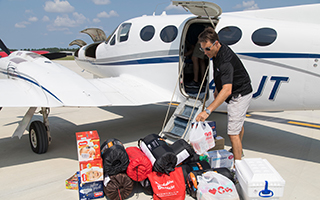
May 5, 2021
Because business aviation is often on the front line lending a hand in times of need, volunteer pilot groups and other aviation organizations wanting to help out after a disaster or emergency should make themselves known to authorities well before an event happens.
It’s essential to connect, establish credibility and make emergency planners aware of your group’s resources, according to several disaster planning experts speaking at a recent Air Care Alliance webinar on “How to Work with State & Federal Agencies More Effectively.”
“Get to know your local emergency manager,” said Patrick Cox, coordinator of training and exercises, Virginia Department of Emergency Management. “They don’t know what they don’t know.”
Cox noted that it’s important for volunteer aviation groups to organize under a single, clear chain of command, and to be as self-sufficient as possible. “You don’t want to become part of the emergency,” he said, adding that volunteers should also be sensitive to political and legal considerations.
Lindy Kirkland, chair of the Virginia Volunteer Pilots Group (VVPG), said that in his state, a government and volunteer cooperative effort leverages the existing infrastructure into official emergency management planning, exercise and actions.
“The mission of VVPG is to assist the commonwealth and help with their utilization of volunteer private aviation,” said Kirkland. “But you’ve got to build that relationship up front, so they understand what you can bring.”
Rol Murrow, founder and chairman emeritus of the Air Care Alliance, reminded webinar attendees that general aviation pilots have participated in disaster relief and emergency response to numerous events over history.
Murrow and other webinar speakers noted the importance of pilots participating in emergency response as part of a local volunteer group, many of which are members of the Air Care Alliance. Pilots or individuals wanting to assist are encouraged to do so as part of an organized group, many of which have MOUs with their local or state emergency response authorities.
To help its members volunteer services in times of need, NBAA established the Humanitarian Emergency Response Operator (HERO) database, which allows aircraft owners and operators to register to assist during a crisis. Learn more about the HERO database.
